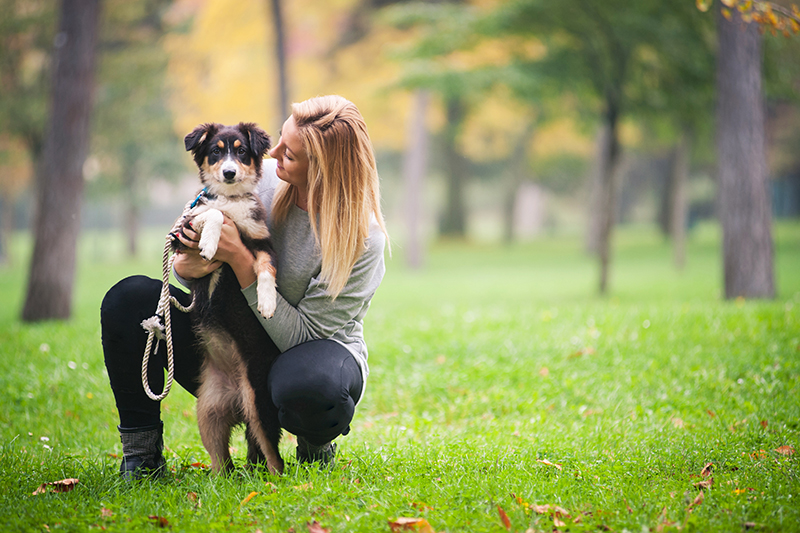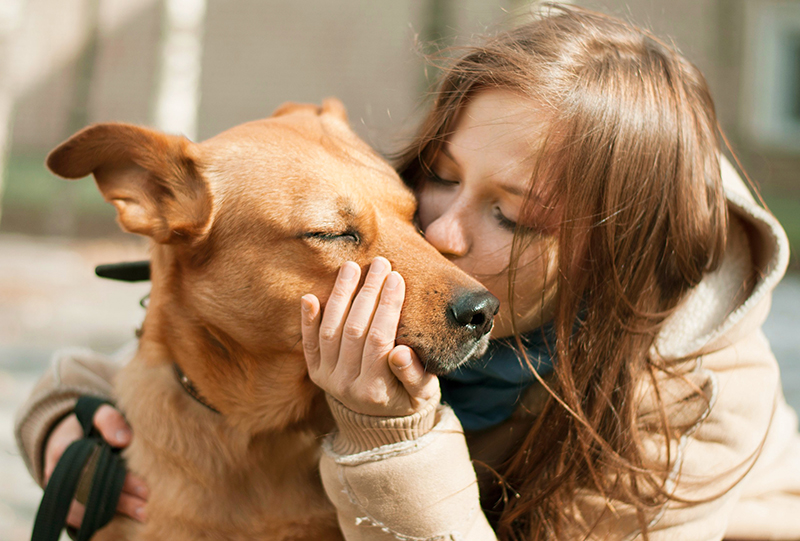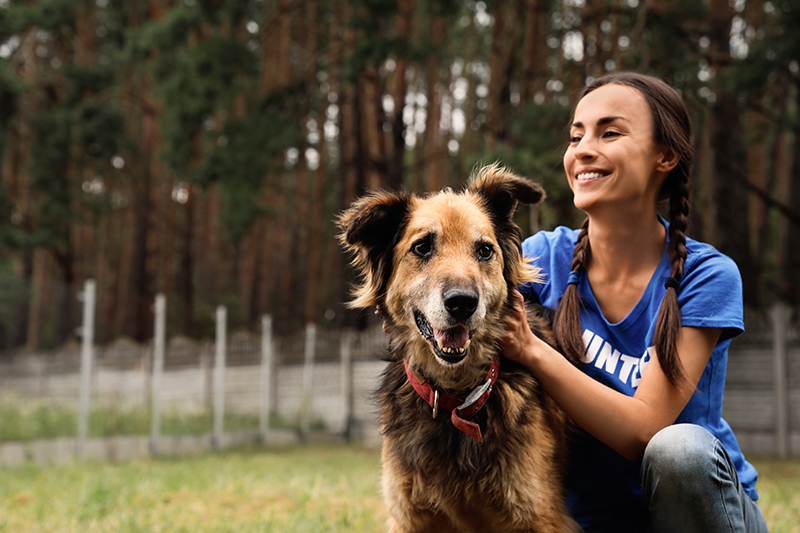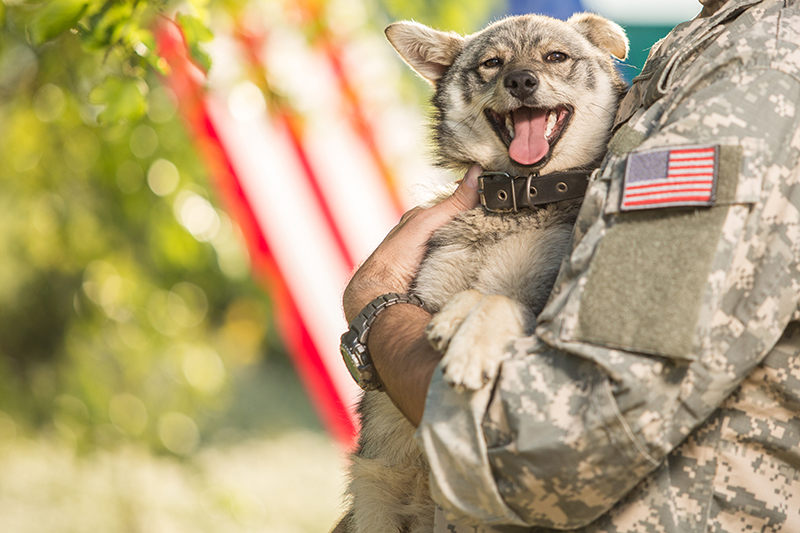Top 3 Reasons To Foster A Shelter Pet
By Christine A. Bournias

What Is Pet Fostering?
The sad reality is that shelters are overcrowded and simply cannot host the volume of furry bodies in need. Fostering is a way to provide temporary care and/or housing for these animals that need to live in a home environment prior to adoption.
By no fault of their own, most often animals are hurt or have serious illnesses that can’t be overcome. Some have insurmountable surgeries that can’t be performed because the animal is too far gone or too old for critical care. These animals, especially senior animals, often are misplaced and are much more difficult to place.

Worse, certain animals are often discriminated against based on their appearance. Unfortunately, the Black Dog Syndrome is real and common amongst shelters. It comes down to which animals have a better chance of adoption. While the numbers are improving, black dogs and cats are more difficult to adopt.
DID YOU KNOW?
October 1 is National Black Dog Day! “A 1998 study of 1,468 dogs offered for adoption at a local Humane Society did find that dogs with black fur were a factor in whether they got adopted. However, at the same time in 2008, the general manager of the Los Angeles Animal Services found that in a 12-month period covering 30,046 dogs, slightly more dogs that were completely or predominantly black were adopted than dogs that were not. And these two aren’t the only contradictory studies.” —Ceasarsway.com, Why Black Dogs Are Less Likely To Be Adopted
Many rescue organizations that don’t have a brick and mortar building in order to host the volume of animals that need shelter are typically run by Foster Pet Parents alone.
Fostering is ideal for some people, but not so much for others. Nonetheless, you must be prepared for all the responsibilities that go along with caring for different animals that may not be your first pick.

Why Do Rescue Organizations Need You To Foster?
Global animal welfare organizations need to relieve overcrowding and place needy animals in permanent forever homes.
And foster homes are in dire need.
When an animal is given the chance to live in a temporary, yet safe and supportive sanctuary, their chances for adoption increase exponentially.
This mission of any shelter is for needy animals to live out their lives in a forever home.
Due to the 2020 pandemic , many shelters hastened their efforts to ‘clear the shelters.’ While that sounds good in theory, it’s more important than ever to make sure these animals remain in loving homes.
Fostering or adopting a pet during time “at home” is wonderful. But as you transition back to your life as you know it—and return back to their semi-regular schedule—make sure that you’re fostering for the betterment of the animal.
Always stay just as committed to your furry companion through any unexpected life circumstances. Foster because you’re truly able to do it, not because you’re ‘bored.’.
Scenarios That Call For Temporary Homes:
- An animal that suffers from anxiety of shelter stress, especially animals that need extra attention. As they await permanent residence in a foster home, their stress diminishes and they become better acclimated to the life of everyday human home life.
- Abandoned, neglected, or abused animals benefit from a healthy human bond
- Disabled, ill, injured, or senior animals that need dedicated medical attention
- Animals in need of socialization and training for a family environment
- People who suffer an area emergency or disaster. Animals displaced due to natural disasters are often awaiting reunion with their families. As these families work to re-establish their lives, they rely heavily on pet fosters.
- Nursing cats and dogs
- Young kittens and puppies that are too young to be adopted

A Shelter Has A Responsibility To Their Animals
Just because you’re fostering, doesn’t mean it’s not as serious as adopting.
Look to an organization that will match animals with homes that best fit the needs of both the animal and the pet foster’s lifestyle. A reputable rescue organization will conduct a thorough vetting process and will find unique ways to save lives and ensure a successful fostering experience.
What An Organization Looks For In A Foster Pet Parent:
- High level of commitment
- Serious ONLY applicants
- Financial security
- Animal experience
- Patience and understanding of shelter’s thorough vetting process
To minimize potential disharmony, shelter experts recommend keeping foster pets and their existing furry companions apart at certain times.When it comes to acknowledging an existing household environment, experienced Foster Pet Parents make sure to have a balance between moderate separation and proper socialization. For example, Foster Pet Parents may walk their own dogs together, but will chose to separate them for playtime and meals.

A Foster Family Has A Responsibility To A Shelter Animal
Just like searching for the perfect adoptee for the animal’s forever home, a reputable rescue organization will also seek out an ideal candidate for pet fostering as well.
The organization who arranges your fostering journey should provide proper information about the animal you’re about to foster. Inquiry about your shelter pet’s entire medical history and temperament before bringing the shelter animal to meet the rest of the family—including other fur family members is a must.

Make sure that the rescue organization is straightforward with you on either a clean bill of health or other pre-existing concerns that the shelter animal may have. If your animal is sick from the beginning, know what you’re getting yourself into.
The rescue or shelter needs to tell you any and all conditions upfront. Be sure that you have access and disclosure as to the animals health history, as well as their complete Veterinarian’s directives.
You’ll be assigned to take your foster to their Veterinarian visits with medical expenses covered by the organization. In order to increase their adoption chances, you’ll be asked to attend adoption events with your foster pet
When it comes to essential supplies, training, and special needs, there’s typically a pivot contact person from the shelter. That contact person should be able to provide you access to proper veterinary care or health & wellness clinics, as well as a 24-hour emergency number, should a problem arise.

Do YOU Have The Right Stuff To Foster?
Not certain you have what it takes to foster a shelter animal? While fostering is a heroic gesture, it isn’t the right choice for all. Therefore, it’s important to make a wise and foresighted decision.
A Foster Pet Parent has a vital role to play in this animal’s life. Fostering a shelter pet shouldn’t be taken lightly. Fosters are essential for the health and well-being of the animal.
As a temporary guardian to a dog or cat in need, Foster Pet Parents are the animal’s advocate. You represent them to the public and are their voice.
Why NOT you?

How Do You Foster Without Falling In Love?
The rescue organization has approached you with the idea of fostering an animal from the rescue organization you support. Now what?
Remember, if you foster an animal, don’t think you won’t fall in love with them. You do fall in love. But, you’re fostering shelter animals to save lives.
“Fostering provides a great way for shelter animals to transition to a new home. When an animal in need receives the opportunity to live in a home environment, the fostering experience teaches the animal basic house manners, as well as the chance to socialize with people and other animals. It’s your opportunity to help animals without a long term commitment.” —Nicole A.
Fostering is one of the most unselfish things you can do for the love of an animal in need.
Foster = Love
Shelter animals usually find you, not the other way around. You have to decide if fostering a shelter animal is for you. Is it the right timing in your life—and do you have the resilience to do so?

What It Takes To Foster
Inner strength.
People will impose their beliefs on you and tell you that they just could never foster. Don’t let their own weaknesses deter you.
Be prepared, they’ll ask these questions:
- “Why do you foster? (I couldn’t do it.)”
- “How can you be a Foster Pet Parent without getting attached?”
- “Doesn’t it hurt when you have to say good-bye?”
You got this.
Answer: Fostering gives a shelter pet a chance to know what true love is.
Here’s the reality: Fosters save lives. And shelters need you.
Characteristics Of A Foster Caregiver:
- Compassionate
- Committed
- Devoted
- Experienced
- Gentle
- Patience
- Stamina
Be the reason they love humans.

NOW Could Be Your Opportunity To Foster
You love your community. And you LOVE animals. Maybe it’s finally time to consider making the move to foster an animal in need?
Your philanthropic gestures do not go unnoticed and you’d do anything to save an animal in need. You give your heart and soul to help support your local rescue organizations by donating money—and precious time—to volunteer at the shelters.
Now you’re in the position to do more. It might just be the perfect time to foster a shelter pet.
Fostering an animal is gratifying and rewarding—it saves lives. Opening up your home to foster an animal in need can help the organization free up a spot for another animal in need also.
Most notable, it may provide you with the opportunity to channel the love you have for animals by caregiving for foster pet(s). By fostering, you have the honor of providing encouragement to an animal in their crucial stages of their life’s journey to being adopted.

3 Reasons To Be A Foster Pet Parent
1. Offers You The Opportunity To Give Back To Your Community
Can’t adopt just yet? Fostering is an excellent alternative. Helping your community by getting involved in adoption events is a good way to make a difference. Search the Petfinder database for local animal welfare organizations that could benefit from your fostering duties.
“Animal welfare organizations work to place lost, abandoned, abused, and relinquished animals in permanent homes. This helps relieve overcrowding and reduces an animal’s stress by providing a temporary and supportive sanctuary while he awaits permanent adoption.” —Pets For Patriots, The Wet Nose Blog
Contact your local organizations and rescue groups to learn about specific opportunities near you. In fact, Best Friends Pet Hotel is hosting adoption events at Pet Hotels near you.

Make Philanthropic Gestures
Fostering a shelter pet is a positive next step toward their forever home. What a better way to give back to your community and to the betterment, health, and well-being of pets in your area.
Follow Neighborhood Rules
Every county and town is different with the amount of animals allowed. Abide by your individual city laws and animal limits per household.
Stay Community Focused
1. Volunteer Where Your Passion Is
2. Help Needy Animals At Your Local Shelter
3. Make A Difference

2. Provides More Room In A Shelter
Fostering an animal in need is the most courageous thing you can do. When you foster one shelter animal, that leaves space for another needy animal to be saved.
You’re saving lives when you foster by giving an animal in need a chance at life. In addition, when you foster and you’re unable to own a pet due to lifestyle restrictions, you’ll reap benefits of pet ownership.
Why Animals In Need Benefit From Foster Pet Parents:
-
- While animals are awaiting adoption, fostering offers a safe and supportive environment
- Fostering reduces an animal’s stress by placing them in a comfortable home
- By fostering, you improve an animal’s chances of obtaining qualified adoption applicants that can lead to adoption
- When you foster a shelter pet, you have the chance to enhance their adoption potential
- Many times relatives or friends of Military members don’t have the experience or cannot commit to long-term deployments. Fostering an animal for a military member provides a temporary, safe home to animals that anticipate being reunited with families following an emergency, natural disaster, or military deployment
According to Dog Is My CoPilot”, these two organizations help provide fostering services for deployed service member’s pet:
Guardian Angels for Soldier’s Pet: Assists active duty deploying military service members, wounded warriors and honorably discharged/disabled veterans with medical/homeless hardship situations to reunite them with their pets following deployments and/or hardships.
Dogs on Deployment : Facilitates an online community to arrange fosters for deployment, family illness. or any other circumstances that render a service member temporarily unable to care for a pet. This online resource was founded by an active duty husband and wife team.

Steps To Consider When Fostering:
-
-
- Make sure you’re ready to foster by considering all aspects of your life
- Consider other family members and/or household pets
- Conduct breed research, animal’s history, and temperament assessment
- If applicable, know how and when to separate your foster pet from other family members
- Work with a reputable rescue organization
- Provide a safe, calm home environment
- Keep animals secure with a fence and/or other escape barriers
- Communicate with one contact person during the transition and fostering process
- Look for transparency on medical health of animal
- Don’t be afraid to ask questions
-

At Home With Your Foster Pet?
There are several things you can do for your foster pet to have a good temporary home.
Homemade tunnels and obstacle courses and hide and seek sessions can be a wonderful way to provide a positive experience for your shelter pet. Nose tricks and interactive mind games help them stay alert. Interesting mental stimulation outside of a loud shelter is always positve.
Treat your furry friend to a frozen favorite dispensing toy or a spa-like pet massage in order to ease stress and comfort tired muscles. Just for fun, you can bake sticky treats for dogs or make a tuna snack for your cat.

Venture Out With Your Foster Pet
Be sure to stay in shape together, enjoy the outdoors, read to them, sing them songs, and go for long walks together. Whether it’s a new direction around the block or a curious sniff and walk, adding adventure to you and your pet’s life is worth the extra energy you will expend.
Jumping through hoops will be new and different for your fostered pet. Also, training courses with a foster dog can be pivotal in their life. Encourage desired behavior and enjoy the process of making mistakes.

Give Them A Good Life: Camp Options
If it’s a dog you’re fostering, seek out your local and trusted Pet Hotel to watch your pets when/if they’re approved to be around other pets. New adventures and Doggy Day Camp offer an unique experience for your foster pet.
Camp benefits your dog’s physical and mental well-being. Remember current vaccinations are required for an interview assessment.

Photo Credit: Best Friends Pet Hotel (Avon)
3. Allows You The Chance To Love Other Pets
Fostering makes you feel needed. It expands the love in your heart. You’re a better person just by knowing another “furry” somebody else. You could be just the person they’re searching for to help them.
Fostering a shelter animal isn’t a replacement for adopting one of your own or filling the void in your heart when you lose your furry family member. It still takes a special person to foster other pets. Remember, your fostered shelter pet is a completely different animal than your own.
Enjoy The Foster Pet For Everything They Are
A foster pet can bring a sense of joy and fresh starts to a family and their future family.
Perhaps you’re still healing through the mourning process of losing a beloved pet? Keep your pet memories alive, but take the time you need to heal. Focus on everything your foster pet is and not what they’re not. Whatever you do, try not to compare the two.

What Is A “Failed Foster?
Most Foster Pet Parents realize when the time comes to let go. They relinquish the shelter pet to another person for adoption because they recognize it’s in the best long-term interests of the animal to have a permanent home.
Foster Pet Parents are there to shepherd the journey for the animals next stage in life. It gives us a chance to channel our love and passion for what we believe in.
However, some Foster Pet Parents fail.
“Sometimes volunteers become so attached to the animals in their charge that they legally adopt them. This is known as a ‘foster failure’ because the capacity of the volunteer to care for other ‘temporary’ pets is diminished by one.” —Pets For Patriots, The Wet Nose Blog
It’s common for fosters who are caring for animals for an extended period of time to develop strong bonds that lead to ‘foster failure.’ Some Foster Pet Parents get too attached to their shelter pets and keep them as their own. This failure situation is acceptable. While they fail the fostering process, they succeed at giving that animal a winning home.

Fostering a shelter animal provides temporary care to those furry friends who benefit from living in a home environment. It’s a terrific way to give a shelter animal a chance, while at the same time enhancing your own life with the responsibility and companionship of an adoring pet.
So, do you have room in your family for one more?
Consider fostering a shelter pet—you could be the best thing that happens to that animal. You might just be that person that’s a lifetime Foster Pet Parent that both your local shelter and community rely on.
Good luck with your decision. We’re here to help.
About The Author:
Christine A. Bournias resides in Michigan with her 2-pack; two new beautiful adopted miracles. As her “Angelwriter”, Nicodemus (1997-2010) is the wisdom behind the stories she shares. Christine champions the magnitude of building the bond between a dog and their person(s) by means of respectful communication and enduring admiration.




